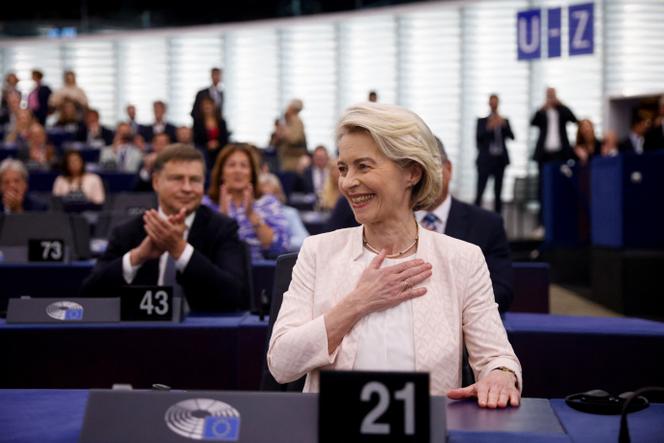


Ursula von der Leyen, little given to effusiveness, made no secret of her delight at the outcome of the European Parliament vote which saw her land another term as president of the European Commission, on Thursday, July 18.
"It's much better than last time," she said, laughing. In 2019, she was confirmed by just nine votes. This time, 401 MEPs (284 against, 15 abstentions) voted in favor of Angela Merkel's former minister, after European leaders proposed to reappoint her on June 27. That's 41 more than the 360 votes required.
Over the past few weeks, the 65-year-old leader has spared no effort to convince every MEP to vote for her. After the outcome of the European elections on June 9, which saw the far right rise while the Greens and Renew liberals lose ground, nothing was certain, and von der Leyen, who has become the embodiment of a green and normative Europe, knew it.
She carried out intensive negotiations with the political groups that form the majority she will rely on to pass her legislative projects in Strasbourg: the Christian Democrats of the European People's Party (EPP), the Social Democrats (S&D), and Renew. But defections were to be expected, including from her EPP camp, where France's Les Republicains (LR), in particular, announced that they would not be voting for her.
In fact, without the 45 or so Greens who supported her candidacy, she would not have been elected. Fratelli d'Italia, the post-fascist party of Italian Prime Minister Giorgia Meloni, did not, however, give her its vote.
"Meloni is now going to have a hard time pushing her interests in Brussels. She's isolating herself," said a European diplomat.
Von der Leyen was faced with a highly complex equation on Thursday: secure as many votes as possible within the EPP, which was criticized for its overly social and green policies during its first term, without angering people on the left, while making promises to the Greens and trying to score points with Fratelli d'Italia. In the final hour before the vote, she delivered a long, tight speech, without any stand-out proposals, which each group was scanning for the key topics it wanted to see included.
The Commission president satisfied her friends in the EPP, who remain the leading political force in the European Parliament, by making "competitiveness and prosperity" her "top priority." Given the EU's economic slowdown in comparison to China and the US, she promised to cut red tape in Europe, simplify procedures at every level, and "create a new pact for clean industry."
You have 61.18% of this article left to read. The rest is for subscribers only.
